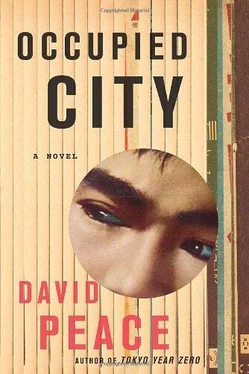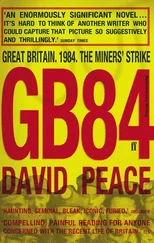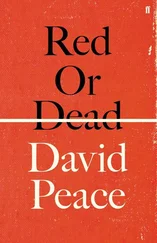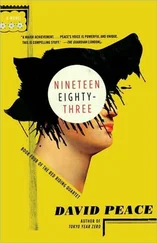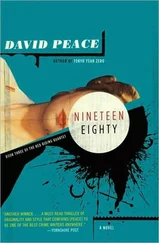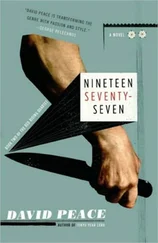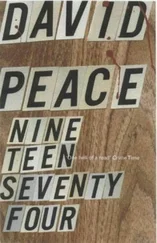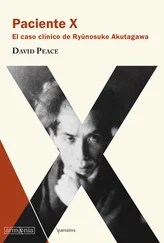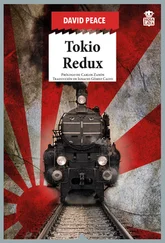IN THE FICTIONAL CITY, again and again I knock on her door, until she says from behind the door, ‘Who is it?’
‘It’s me,’ I say. ‘It’s Takeuchi.’
‘What do you want?’
‘He’s confessed,’ I tell her. ‘Hirasawa has confessed!’
The lock turns. The door opens. Murata Masako stares at me. Murata Masako says, ‘But it wasn’t him. I know it wasn’t him.’
‘But it was him,’ I tell her. ‘He’s confessed everything, says he made the unsuccessful attempts to poison and rob the employees at Ebara and Nakai, that he did what he did at the Teikoku Bank for money, that he needed the money for his tempera paintings and for family reasons, and that it was him and him alone …’
‘I don’t believe it,’ she says. ‘I can’t.’
‘Well, you should and you must…’
‘Why?’ she asks. ‘Why must I?’
I step forward into her genkan . I take her hand in mine. I say, ‘Because it means it’s over, it’s finished now. You don’t have to be afraid any more, you can forget it, forget him. You can move on now, you can start a new life. We can start…’
‘We?’ she laughs. ‘We? Us?’
‘Yes,’ I say. ‘Together …’
‘Are you asking me to marry you?’ she whispers.
‘Yes,’ I say. ‘I’m asking you to marry me.’
‘As a reporter,’ she says. ‘Or as a …’
‘As a man,’ I say. ‘I’m going to quit my job …’
‘You’re going to quit your job? Really?’
‘You don’t believe me?’ I ask her.
In the Fictional City, in the genkan to her house, Miss Murata Masako stares at me, Miss Murata Masako stares at me and says, ‘I don’t know what to believe any more …’
‘Believe me,’ I say. ‘Please …’
‘I’m not sure I can …’
‘Then pretend,’ I say. ‘Let’s both pretend …’
IN THE FICTIONAL CITY, I walk her streets and I hear her stories, but I’ve had enough of her streets and enough of her stories, her telephones and her voices, her wires and her cables, her alleyways and her back rooms, all her times and all her places –
‘I just want to know who did it…’
The man slowly folds up the newspaper. He takes off his glasses. He puts the glasses in the breast pocket of his jacket. He sits forward in his chair. He looks up at me and he says, ‘But why?’
‘For me,’ I say. ‘Not for a story, not for the paper.’
The man smiles and says, ‘What difference would it make? They’ve got their man and you’ve got your story …’
‘I don’t want any more stories,’ I tell him.
The man laughs, ‘No more stories? Bit late for that, isn’t it?’
‘Yes,’ I say. ‘But no more stories, please …’
IN THE FICTIONAL CITY, I stand before my editor’s desk –
‘Ah, Takeuchi,’ says Ono. ‘You still here?’
‘Well, not for much longer,’ I say. ‘But I just wanted to say goodbye and also to thank you for all you have done for me.’
‘So you’ve not changed your mind, then?’ asks Ono. ‘Never too late to change your mind, you know …’
‘No,’ I say.
‘Well then, I’m sorry to lose you,’ says Ono. ‘I had high hopes for you, very high hopes for you.’
‘Thank you,’ I say.
‘No, don’t thank me,’ says Ono. ‘It’s probably all for the best. I always told you, in this business there’s no room for doubters, no room for quitters. Don’t get me wrong, I thought you had potential, thought you had a future. But if this business is not for you, it’s not for you. So what is for you? What now, what next, Takeuchi?’
‘The Japan Advertising and Telegraph Service.’
‘Advertising?’ laughs Ono now.
‘Yes,’ I say. ‘Copywriting.’
‘Well, I hope you’ve got a good imagination …’
IN THE FICTIONAL CITY, it is November 1948, and the headlines on today’s newspaper, my old newspaper, all the newspapers read:
TOJO AND 6 OTHERS ARE SENTENCED TO HANG; 16 DRAW LIFE; SHIGEMITSU GIVEN 7 YEARS; ACCUSED GUILTY ON 1 TO 8 COUNTS
In a hotel room full of journalists and policemen, of survivors and witnesses, we are sitting side by side on a stage in our wedding costumes, Masako with her eyes closed, tight –
In the Fictional City, I whisper –
‘Let’s pretend …’
IN THE FICTIONAL CITY, let’s pretend that an innocent man is guilty, that he deserves to be convicted and sentenced to death, and that the police conducted a proper and thorough investigation, let’s pretend that the Government and GHQ did not conspire to pervert the course of justice, that the newspapers and their reporters were not complicit in their stories, and that everything we read is true –
In this city made of paper, this city made of print –
In this Fictional City, let’s pretend …
Beneath the Black Gate, in its upper chamber, among the flurries and the flakes, the paper flurries of paper flakes, these black and white flurries of news-paper flakes, this former Master of Insincerities, former Master of Lies, he looks up from the damp floor of the occult circle and now he whispers, ‘Let’s pretend that this city is not a story, not a fiction, not made of paper, not made of print…
‘Let’s pretend that we are not just your stories, not just your fictions, that we are not made of paper, not made of print…
‘Let’s pretend all your papers are now a finished manuscript, that your manuscript is now a book, a book called –
‘Teigin Monogatari…
‘Let’s pretend that this book has come, this book not a fiction, and that this book absolves the innocent and accuses the guilty …
‘Let’s pretend that this book ends the whole mystery, that this book solves the whole case, that this book solves the crime …
‘This crime and all crimes, all mysteries …
‘All stories, all fictions now ended …
‘Let’s pretend, sweet writer …
‘Let’s pretend …’
Now he closes his eyes and begins to count, to count out loud, ‘I say one, I say two, I say three, I say four, I say five, and I say six.’
And now the journalist opens his eyes and stares at the candle before him, the sixth candle. But now the journalist shakes his head.
He leans forward on his knees, on the damp floor, in the occult circle, leans forward towards the sixth candle.
Now the journalist blows out the candle –
The sixth candle.
In the half-light, you are alone again, in the upper chamber of the Black Gate, in the occult circle of now-six candles,
and in their half-light, alone again,
you half-whisper, you half-beg,
‘Let’s pretend, please …’
That all these words are not just the sum of their absences, that you, you are not the sum of your absences;
that a man is not what he lacks,
this city, this country,
not what they lack,
this world –
‘Lacks?’ laughs a voice now, the Black Gate spinning, spinning and spinning. ‘Lacks what? Look outside this window, Mister Writer. Look at the height of those buildings, those skyscrapers. Look at those people down below, in their suits and in their cars. Not on their hands, not on their knees –
‘They lack for nothing. Nothing!
‘Because of me! Me! Me!’
The six candles gone, the occult circle gone, the upper chamber gone, the Black Gate gone, and now you are standing in an enormous room, on thick carpet, high above the city,
THE FUTURE CITY rising, here, now –
‘But I am everything you hate,’ laughs the man beside you, his hand on your shoulder, fingers in your flesh and nails in your bones. ‘For I am the future, your future! Now …
The Seventh Candle — The Exhortations of a Soldier, Gangster,Businessman and Politician
Читать дальше
